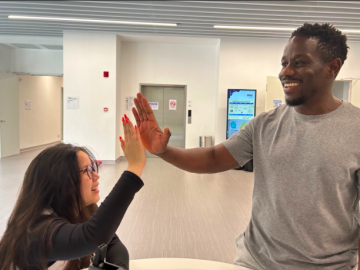
By Zoe I.
What is advisory in AISGZ? People might wonder whether if it is beneficial for the school or to the AISG students. The official meaning of “advisory” is “the power of making recommendations but not enforcing them” (Oxford languages).
The advisory program usually consists of small groups of students with a teacher. With the objective of bonding/making a stronger connection with a trusted adult. A professional advisory program also consist with clear objectives, according to various online sources.
The AISGZ official website said “The Advisory program seeks to create a sense of belonging and promotes a positive self-image to ensure that each student is connected and advocated for.”
Every Monday, between first period and second period is when advisory begins. A time where a specific teacher will be either teaching you about studying skills, goal setting, or social and emotional learning. Where teachers also ask how the student is feeling, or how they are doing. Creating a bond between the teachers and the student.
Studies have shown that 40% of the people who made stronger bonds with their advisory compared to the ones who didn’t had greater achievements and easier to new environments. (PsyInfo Data base Record © 2022 APA).
AISGZ has done well in allowing students to understand why this program is here. As to one grade 10 students understanding “To help students manage problems or mental health”. Teachers also understand the meaning of this program as “I do think advisory is very useful and I do think it really helps work faster in the relationship” Mr. Huang said. Adding on, students also believe that it is helpful too, “I think in some way yes, it gives lessons and provide activities to have people engage in the activity— it teaches students about community and friendship, also empathy” as another 10th grader said.
Although AISGZ has a clear objective of what to aim, it is possible that the clear objectives cause some disagreements. As during the lessons given, it is possibly harder to tell your true thoughts to the whole class compared to one teacher. As another grade 10 student said “I will not tell my true thoughts on the lesson during advisory directly to the teacher, but I probably will to my friend”. A grade 10 student also agrees with saying “not really” comfortable telling the truth.
As students understand the meaning of this program, but not always agreeing with how the program has been formatted. But there are situations where students do make bonds through the advisory class, but not exactly with the advisory curriculum.
For example, a grade 10 student said “Personally, I do find my advisory teacher useful, I always talk to her. However, I find the advisory curriculum not as beneficial”, with another 10 grade student agreeing with “bonding in advisory is good, but lessons are not as beneficial.” Showing that teachers can making bonds with students, but sometimes not through the curriculum, but through other ways.
It has also shows that the roles of teachers are also slowly being changed. As they are not only here to check up with students, but also teach student life skills and boundary relationships. Looking through students saying “I find my advisory teacher useful…but the advisory curriculum somewhat not as beneficial” and “Lessons are useless, they’re all talking about common sense”.
Interpreting that the lessons from the advisory program aren’t as useful as just bonding or chatting with a teacher.
There also has been suggestions of the timing of the schedule of advisory. As a grade 10 student suggests that “… and the timing is weird. I think we should change back to the old schedule, where advisory is before lunch(but doesn’t take away our own time from the 1 hour in total)”.
The objective of AISG (the official website) saying “create a sense of belonging” has been successfully made, with the students understanding why it is here, and actually being able to bond with teachers. However, through the evidence from the interviews, it is possible that the AISGZ curriculum may be in the way of the bonding/creating relationships.